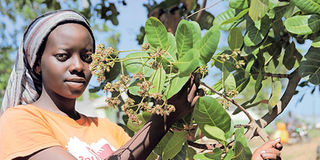Premium
From grace to grass: Once wealthy cashew nut women now wallow in poverty

Grace Mapenzi checks on cashew nuts grown on her parents' farm in Kilifi County.
They once owned a school, and many dreamed of building two-storey houses for themselves and their families. Now, many of the women who were employed at the Kilifi Cashewnut Ltd are beggars, living in squalor and depending on their jobless children to take care of them.
Seated outside her makuti-thatched, mud-walled house at Kisumu Ndogo village in Kilifi, Loice Mbeyu, 66, says the collapse of the state-owned cashew nut factory was a blow to the women who depended on it for a livelihood.
The most affected were women because they were the majority at the factory – 3,000, to the 1,500 men. The women were deployed in sections such as peeling, sorting and grading, and roasting of the nuts, while men were employed to operate the machines, or were mechanics.
“Life was good when we used to work at the factory because we could take our children to school, pay our bills and provide for our families,” she says.
Mbeyu was unable to realise her dream of owning a two-storey house, which she had planned to build on land she had bought using her savings.
"I had come up with a plan for my house. I had to drop all my plans since I did not have money, and I used the little I had to provide for my family until it was finished,” she says.
She could no longer afford to take her six children to school. Now, some of them are self-employed while others are jobless at home.
Factory shut down
Mbeyu started working at the factory in 1976 – a year after it was opened. She was in the shelling section until 1980, when she was moved to the factory’s dispensary as an assistant.
“One day, at 8am, our management team convened a meeting and asked us to immediately vacate the premises since the factory will no longer be operating. By 2pm that same day, everybody had left the factory compound and the only people who remained were some officials who were doing the clearance,” she says.
The money the women used to earn had enabled them to live decent lives. Those in the shelling department earned Sh275 monthly. Mbeyu was paid Sh800 as an assistant at the dispensary. They would all save a minimum of Sh50 each monthly in their sacco, and they could get loans at any time.
“Business was booming because money was available for everyone at any time. Some women used to take loans for development while others could use the money to treat their men,” she adds.
The presence of the factory led to the establishment of the famous Mkoroshoni market, which attracts thousands of traders from Mombasa and Tana River counties.
Patience Mshenga alias Baby, is a neighbour of Mbeyu.
She is among the founder workers of the factory in 1975. She was a clerk, and later, the chairperson of Korosho Academy – a primary school that was started by the workers.
When it all came crashing down, the mother of five says, the management only told the workers that the factory did not have enough raw materials to sustain its operations.
Desperate and depressed
"No one came out clear to tell us what happened that led to the collapse of the factory, which was our hope, we knew the government had recognised the cashew crop and the role it played in the economy, because President Mzee Jomo Kenyatta officially opened the factory and even issued us with certificates of recognition for our good work.”
She says the women came up with the idea of starting a school for their children. They contributed Sh20 monthly until the money was enough for construction.
“Majority of the women were single mothers who had left their children with their mothers back in the villages. They felt that they were earning enough money for their children to access quality education,” says Mshenga.
The women moved their mothers and children to live in Kilifi.
“Life was smooth, and the women were committed to their work as their mothers took care of their grandchildren.
“In the beginning, we were employed as casual workers and we were being paid Sh45 every week, before being employed as permanent workers in 1976,” she says.
“Women are now desperate. Majority of those selling coconut, cassava, and fish in the markets used to work at the cashew nut factory,” she adds.
Those are the lucky ones. According to Mshenga, many others died out of shock, and diseases due to a diminished standard of living.
“Some of the workers could not afford food for their families and even pay rent and they sank into depression, while some are sick," she says.
Mshenga and Mbeyu hope the government will revive the factory and create jobs for the women and youth of Kilifi, and lift them out of poverty.





